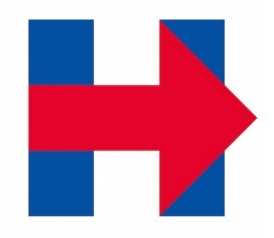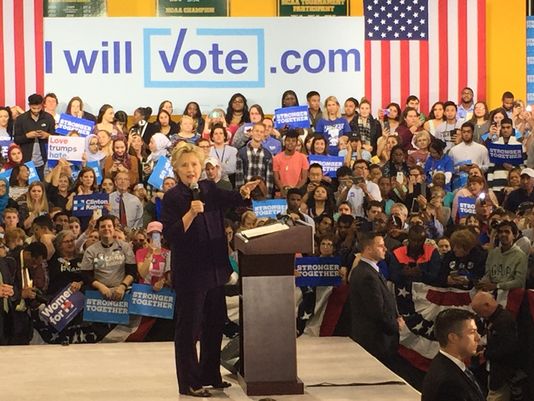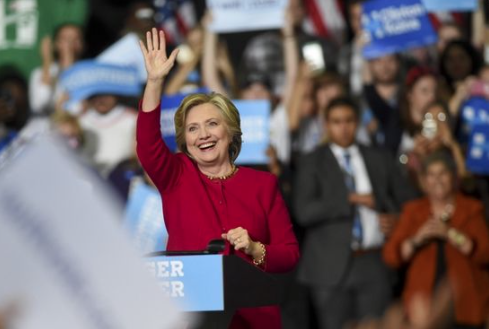
In just the few days since the New York Times published its latest groundbreaking report, Donald Trump has faced ongoing fallout from his “legally dubious” tax avoidance that even his own lawyers thought wouldn’t hold up to IRS scrutiny – as well as new reporting on his various efforts to avoid paying millions in taxes. The ongoing reporting underscores the urgency of Trump releasing his tax returns before Election Day. While his campaign has objected to these stories, they refuse to release his tax returns – including just-filed returns that would not be under audit – to provide evidence of any untruths.
His behavior also raises important questions, including one that was posited by the New York Times Editorial Board: “Why would a man who has spent most of his professional life avoiding the shared responsibility of taxes all of a sudden care about helping others, especially those less fortunate?”
NEW Reporting
New York Times: Donald Trump Used Legally Dubious Method to Avoid Paying Taxes: “Tax experts who reviewed the newly obtained documents for The New York Times said Mr. Trump’s tax avoidance maneuver, conjured from ambiguous provisions of highly technical tax court rulings, clearly pushed the edge of the envelope of what tax laws permitted at the time. ‘Whatever loophole existed was not ‘exploited’ here, but stretched beyond any recognition,’ said Steven M. Rosenthal, a senior fellow at the nonpartisan Tax Policy Center who helped draft tax legislation in the early 1990s.”
Wall Street Journal: Income Taxes Aside: Donald Trump’s Other Tax-Avoidance Moves: “The Journal has found several additional examples of state and local tax issues for Mr. Trump and his companies that are little known or not previously reported on.”
- “A vendor said in a legal deposition in 2008 that Mr. Trump refused to pay $48,000 in sales taxes on draperies for a Las Vegas property.”
- “At least five federal, state and local tax collection agencies took out at least 26 liens on Mr. Trump’s businesses and him personally since the late 1990s due to claims that Mr. Trump or his businesses didn’t pay sales taxes, withholding taxes, or other corporate taxes.”
- “The biggest amount in liens and warrants, totaling about $11.8 million, were for corporate taxes imposed on his Indiana casino business in the early 2000s.”
Washington Post: This is the portrait of Donald Trump that his charity bought for $20,000: “Tax experts say that if Trump hung the painting at one of his homes or businesses, he may have violated laws against “self-dealing.” Those laws prohibit charity leaders from using money from their nonprofits to buy things for themselves, or for their businesses. In recent weeks, The Washington Post has reported other instances in which Trump may have violated those rules.”
Additional Fall-Out
New York Times Editorial Board: Avoiding Taxes, Trump-Style: “Indeed, even as Mr. Trump’s lawyers were advising him against this approach, one tax expert wrote that trying to find legal support for it was like trying to find evidence for ‘the existence of the Loch Ness monster.’”
Washington Post: A big, dirty secret from Donald Trump’s tax returns has been exposed: “Experts had missed Trump’s maneuver, Kleinbard said, because they did not think that it would have been allowed at the time… ‘The real surprise here is that he apparently got away with it’ … Kleinbard said that he would have enjoyed bringing Trump to court on behalf of the authorities in order to force him to pay up. ‘I would have been certain that I would have won.'”
Vox: Two experts say Donald Trump should be investigated for criminal tax evasion: “Various aspects of this almost certainly violate the laws governing charities (he’s already been sanctioned by the state of New York), but several experts are also raising the question of whether Trump is guilty of criminal tax evasion… But both Philip Hackney, a former IRS attorney now working as a professor of tax law, and Adam Chodorow, a tax law professor at Arizona State University, have written that the elements exist to at least begin an investigation.”
New York Times: How Donald Trump Avoided Paying Taxes Using Other People’s Money: “The story of how Mr. Trump sidestepped a potentially ruinous tax bill emerged from documents recently discovered by The Times during a search of casino bankruptcy filings. Mr. Trump structured his companies to allow him to have lucrative personal tax advantages, while limiting his personal liability should business go bad.”
Vanity Fair: How Donald Trump Used Other People’s Money to Avoid Paying Taxes: “Donald Trump is both unapologetic about using “other people’s money” whenever possible, and proud of the way he allegedly avoided paying income tax for years by writing off nearly a billion dollars in losses, as The New York Times first reported last month. Now, a new trove of documents obtained by the Times reveals how Trump combined both of those things to wipe out his liabilities, using investors’ money to avoid reporting hundreds of millions of dollars in taxable income in the form of canceled debt on his floundering casino empire—a maneuver that even his own lawyers warned would likely get him in trouble with the I.R.S.”
Mother Jones: NYT: We’ve Figured Out How Trump Gamed the Tax System: “If I’m reading this right, the basic story is that Trump gave his banks “New Bonds” in place of their old bonds and classified the new bonds as equity shares in the casino partnership. Trump then valued the equity as equal to the old debt, thus showing no net loan forgiveness and therefore no COD income. This despite the fact that, in reality, the equity was close to worthless.”
Vox: Donald Trump used a dubious loophole to make millions in taxable income disappear: “He has previously boasted publicly of his extensive and detailed knowledge of the tax code, which seems like a good prima facie reason to at least look into it a little. And the New York Times’s latest revelations show a man who was deliberately and knowingly aggressive in his tax strategies in other realms of his personal finances, intentionally pushing forward with a strategy his lawyers said would likely be disallowed.”
MSNBC: Trump stretched tax loopholes ‘beyond any recognition’: “The fact that Donald Trump didn’t pay federal income taxes for many years is not in dispute – because the Republican presidential candidate admitted it during a nationally televised debate. There is some question, however, about whether or not Trump’s exploitation of tax loopholes was entirely legal…. Don’t try this at home. Trump has tried to get away with tax maneuvers the typical American should not attempt.”
Los Angeles Times: Clinton renews calls for Trump to release tax returns following report he skirted laws: “Trump’s attorneys advised him at the time that if he were audited, the Internal Revenue Service would not look favorably upon the tactic, according to the report. For months now, Trump has eschewed releasing his tax returns, claiming he was under audit by the IRS. However, even while being audited, Trump could still release his returns, experts have said.”
Slate: We Now Have an Even Clearer Picture of How Brazenly Trump Tried to Avoid Paying Taxes: “Now, thanks to the latest investigation of Trump’s taxes by the New York Times, our portrait of Trump as a taxpayer is a little bit clearer: He isn’t just a businessman who’s so brilliant he managed to lose, either outright or on paper, close to $1 billion. He’s also one who tried to push the law to its limits—and perhaps past them—to avoid paying the tax man.”
IN CASE YOU MISSED IT
New York Times
Editorial Board
November 1, 2016
Donald Trump’s claim that he was smart for figuring out how not to pay federal income taxes was obnoxious when he said it, at least for the millions of Americans who pay their fair share. Now we learn that he was able to avoid some of those taxes decades ago with a tactic that is illegal now and was highly dubious even then.
In the 1990s, with his Atlantic City casinos and other businesses tottering on the verge of collapse, Mr. Trump negotiated a deal under which his creditors — investors and banks — would forgive part of the debt in exchange for equity in partnerships he controlled. Without such swaps, Mr. Trump would have had to report the forgiven debt as income, offsetting a big portion of the $916 million loss he claimed on his tax return in 1995. That loss allowed him to avoid paying taxes for up to 18 years.
It is impossible to know whether the Internal Revenue Service challenged Mr. Trump’s use of the swaps because, unlike every major party presidential nominee for nearly 40 years, he refuses to release his tax returns. But as The Times reported on Monday, the maneuver was so suspect that his lawyers advised against it.
And it’s clear that even then tax officials and federal lawmakers were hoping to end the practice because it allowed businesses and rich individuals to avoid taxes by swapping forgiven debt with equity that was worth little or nothing. Indeed, even as Mr. Trump’s lawyers were advising him against this approach, one tax expert wrote that trying to find legal support for it was like trying to find evidence for “the existence of the Loch Ness monster.”
Congress barred such swaps by corporations in 1993, and by partnerships, the business structure Mr. Trump uses, in 2004.
As is its habit, Mr. Trump’s campaign chose to regard these latest revelations as yet another display of his genius. But like any other effort to game the tax system, his tactics imposed real costs by shifting the burden to taxpayers who have no recourse to such strategies and must pay full freight, including people whose taxes are withheld and cannot shelter their income even if they want to.
It has become ever more difficult for the I.R.S. to police the kind of tax avoidance Mr. Trump has engaged in. The Republican-controlled Congress cut the I.R.S.’s budget by about $500 million in 2015, and last year the agency audited just 0.8 percent of individual taxpayers, down from 1.1 percent in 2010. Its enforcement staff has shrunk by 23 percent since 2010, to 39,000 people, according to the Center on Budget and Policy Priorities.
The latest disclosures about Mr. Trump’s taxes also further undercut the argument that he is uniquely qualified to fix what he has called a rigged system. Why would a man who has spent most of his professional life avoiding the shared responsibility of taxes all of a sudden care about helping others, especially those less fortunate? The truth is, of course, that he has no intention of doing so; according to a recent analysis by the nonpartisan Tax Policy Center, Mr. Trump’s tax proposals would confer by far the greatest advantages on the wealthiest Americans.
For all the latest, follow our Scheduled Events page and follow Clinton on Twitter, Facebook, YouTube, and Instagram. Also, be sure to subscribe to the campaign’s official Podcast, With Her.



